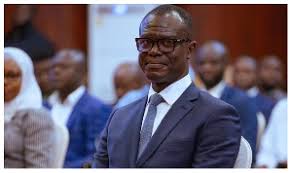1st Deputy Governor Touts Commodity-Led Strategy for Ghana’s Economic Resilience
First Deputy Governor of the Bank of Ghana (BoG), Dr. Zakari Mumuni, has underscored the growing importance of commodities as instruments for portfolio diversification, economic growth, and geopolitical influence.
Speaking on the theme “Leveraging Commodities: The Central Bank’s View” at CNVERGE 2025, Africa’s premier trade banking thought-leadership event, Dr. Mumuni said that commodities are increasingly being integrated into policy frameworks to address supply chain disruptions, inflationary pressures, and market volatility.
“The global economy has entered a new era, where commodities are not just exported, but strategically leveraged to build resilience, unlock liquidity, and drive inclusive growth,” Dr. Mumuni stated, adding that the BoG is committed to aligning with this global shift.
Citing Ghana’s gold sector, the Deputy Governor noted that despite being Africa’s largest gold producer in 2019 and the seventh globally, the country did not add to its gold reserves that year, even as central banks worldwide acquired 670 tonnes of gold for reserve diversification. Gold accounted for 56% of Ghana’s total export earnings, yet contributed little to the nation’s reserve portfolio until 2022.
To address this gap, the BoG launched the Domestic Gold Purchase Programme (DGPP) in June 2021 after studying similar initiatives in countries including the Philippines, Ecuador, South Africa, Turkey, and Mongolia. The DGPP aimed not only to boost reserve accumulation but also to unlock the broader potential of Ghana’s commodity base.
The initiative later paved the way for the Gold for Oil (G4O) programme in 2022, which leveraged the DGPP framework to support the importation of petroleum products through government-to-government arrangements.
According to Dr. Mumuni, the G4O intervention secured petroleum imports at competitive prices, eased pressure on the foreign exchange market, and stabilised ex-pump fuel prices, helping to moderate inflationary pass-through effects.
Further diversifying the financial market, the BoG introduced the Ghana Gold Coin (GGC), a high-purity, investment-grade gold coin serving as a store of value, inflation hedge, alternative asset class, and monetary policy tool to manage excess liquidity.
The GGC, Dr. Mumuni said, has opened new avenues for wealth preservation and portfolio diversification for Ghanaians, particularly in times of economic uncertainty.







